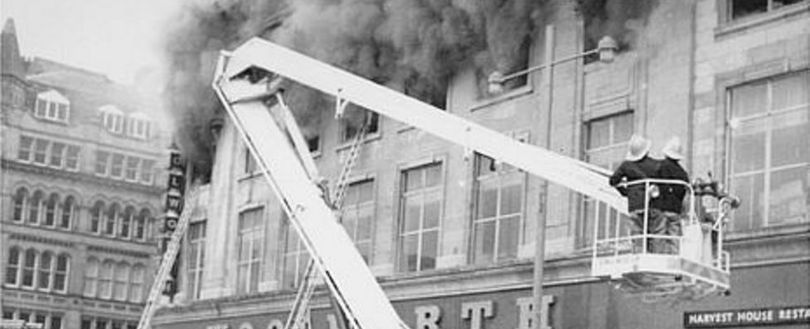- Homepage
- News
- Blogs & Articles
- On this day, historic disasters: Woolworths fire, Manchester

On this day, historic disasters: Woolworths fire, Manchester
Like it? Share it!
08 May 2024 by FIA Team, FIA Team
On May 8th, 1979, the former iconic high street store Woolworths, situated opposite Piccadilly Gardens in Manchester, became the location of a devastating fire, claiming the lives of ten individuals and leaving six firefighters injured.
Around 500 customers were trapped inside the store when a fire broke out, releasing thick black smoke. A call was made to the emergency services at approximately 13:30 by a radio operator from a taxi company stating one of their drivers had witnessed smoke coming from the store. It is reported that 11 other calls were made to the fire and rescue service. The arrival of the fire and rescue service was swift, with firefighters on site 1 minute and 50 seconds after the call was made. On their arrival, the severity of the situation became clear as people were seen seeking help from windows while smoke rose from the six-story building.
The majority of those trapped inside were rescued and brought to safety through the shop doors, windows, and the roof.
At approximately 15:51, it was declared that the fire was surrounded, enabling a thorough search of the building to be carried out.
Following the fire and subsequent investigation, it was documented that most of those who deceased were located within the restaurant area on the second floor, with the presence of the thick black smoke being attributed to causing their deaths due to the obscuration of the escape routes and them succumbing to smoke inhalation.
It was discovered as part of the investigation: Woolworths was, in essence, a dangerous hazard, with some describing the store as a “death trap”. A damaged electrical cable was deemed to be the cause of the fire which ignited nearby furniture made of polyurethane foam, releasing thick, black, and toxic smoke. The absence of a sprinkler system allowed the fire to spread rapidly, adding to the difficulties faced by the firefighters to control the situation.
Rescue efforts were further hampered by the presence of iron security bars fitted externally to the upper floor windows. Fire crews, armed with axes and crowbars, struggled to get the bars loose, resorting to the use of specialist cutting machinery which had to be transported to site incurring further delays that may have been pivotal in saving some of those who sadly lost their lives.
Many questions arose within the firefighting community, prompting a pivotal moment at the year’s annual FBU (Fire Brigades Union) conference.
John Hodder, an FBU delegate of Greater Manchester and John Ross, an FBU delegate from Essex both questioned the necessity of barred windows on the second floor, emphasising the urgency for reevaluating fire and safety regulations. Further concerns were expressed by Trevor Jones, the London delegate, regarding the escalating risk posed by flammable materials, particularly foam in furniture.
This marked the inception of a relentless campaign by the FBU to challenge the use of flammable foam in furniture. The tragic Woolworths fire was a catalyst for a collective effort that eventually, in 1988 led to the introduction of The Furniture and Furnishings (Fire) (Safety) Regulations. These regulations mandated furniture manufacturers to adopt the use of safer materials, marking a crucial turning point in fire safety practices.
As we reflect on the Woolworths fire, its lessons resonate across diverse sectors of the fire industry. It serves as a stark reminder of the importance to continually reassess and enhance safety protocols and training, ensuring that tragedies of this magnitude become restricted to the past. The legacy of the Woolworths fire lives on, shaping a safer future for fire professionals and reinforcing the commitment to preventing such tragedies in the ever-evolving future of fire safety.
-

FIA Team
FIA Team
Related posts
-
Navigating Gateway 2 & 3: Supporting Fire Safety Professionals
17 September 2025
By FIA Team, FIA Team
Related news
-
Record Rise in E-Bike and E-Scooter Fires Across London
28 January 2026
